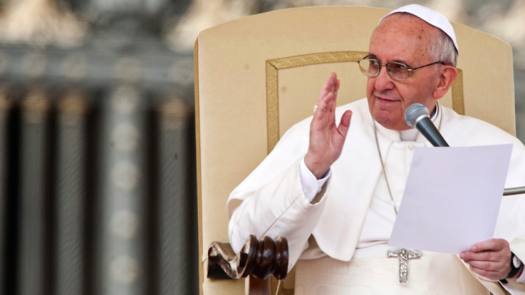A Placemaking Journal
Pope Goes Global: Let’s talk local
Even before last week’s official release of Pope Francis’s encyclical on climate change, advocates and defenders were honing their talking points. In April, liberal Catholic author Gary Wills upped the ante on what was anticipated — accurately, it turns out — as the the pontiff’s vigorous critique of global inequities exacerbated by climate change:
“The fact that the poor get poorer in this process is easily dismissed, denied, or derided,” said Wills. “The poor have no voice. Till now. If the pope were not a plausible voice for the poor, his opponents would not be running so scared.”
Michael McKenna, a Republican energy lobbyist who described himself as a conservative Catholic in an interview with the New York Times, dismisses the challenge. “This pope,” he said, “is selling a line of Latin American-style socialism.”
Then came the June 18 release of the actual document. Which set us all off combing its 190-plus pages for passages that justified our hopes or our suspicions. Pope Francis delivered on expectations. Though perhaps not quite at the level depicted in this “movie trailer”from a Brazilian group:
The encyclical earned major props from New Urbanists and others committed to bolstering communities’ resilience and to reversing the resource-sucking effects of suburban sprawl. The headline on Andrew Stokols’ CityFix blog pronounced Pope Francis “the first Urban Pope.” (Okay, Stokols reminds us, there was that guy in the third century who was actually named Pope Urban; but let’s get real here.)
“The encyclical,” said Stokols, “in addition to focusing on environmental degradation and poverty, also contains an even more subtle critique of the failure of modern urban environments to provide for people’s needs for community and cultural identity.” He grabs a key passage from the document to make his point:
The extreme poverty experienced in areas lacking harmony, open spaces or potential for integration, can lead to incidents of brutality and to exploitation by criminal organizations. In the unstable neighbourhoods of mega-cities, the daily experience of overcrowding and social anonymity can create a sense of uprootedness which spawns antisocial behaviour and violence.
There was plenty more where that came from. The pontiff promotes the potential of a “communitarian salvation” that “generates creative ideas for the improvement of a building or a neighbourhood.” And he reminds us of the interconnections between the built and natural environments, between all living things. He calls it “an integral ecology, one which clearly respects its human and social dimensions.”

Clearly, the Pope is going big. Which explains both the excitement among those already on board and the resistance of those who aren’t. Somewhere in between there’s a niche for those able to connect big ideas with meaningful action.
The condition that allows opposing views of climate change to be unresolved is that, so far, the debate exists mainly in the theoretical realm, especially for those with enough wealth or influence to adapt to unwelcome change. The delay between cause and effect complicates everything. Without a Sandy or a Katrina to spill the immediate evidence of disaster 24/7 across TV and computer screens, potentially catastrophic threats with low probabilities of occurrence inspire blue ribbon commissions and lofty resolutions. But for lots of understandable reasons, they don’t generate a lot of action.
If you need reminders of how humans make decisions on issues like climate change, check out this post from Vox. And if you want to explore more the problems with a coordinated international response, read this recent New York Review of Books piece by William D. Nordhaus.
If we’re not careful, failure to achieve solutions on a scale worthy of the hopes many of us share with Pope Francis — especially in a timeframe responsive to the scariest projections of climate change models — leads to despair. And to more paralysis. So maybe it’s time to take out those old “Think globally, act locally” bumper stickers, and get some models working in our neighborhoods and towns.
Fortunately, New Urbanist practitioners have never stopped doing that. The best examples of their work follow the prescriptions of my PlaceMakers colleague, Kaid Benfield, in this early June post that works as a table-setter for the encyclical:
It is almost a tautology to declare that our future, and that of our children and their children, depends on how we shape our communities for the 21st century and beyond. Here in the US, we’re going to be growing, and growing a lot: How we manage that growth will affect everything from how healthy our economy will be to how nourished and happy we will be as people to, yes, how healthy the future of our planet is. Frequently lost in the increasingly sharpening debate over climate change and global warming is that being thoughtful about managing future land development can make a significant difference in helping to curb carbon emissions and their very serious consequences.
Kaid points out that there’s good news in that “growth in both sprawl and traffic has slowed considerably as people rediscover the benefits of living in cities and walkable suburban neighborhoods. We now have favorable market trends to build on as we figure out new approaches (and, in some cases, reclaim old ones) to create better, healthier communities that also happen to be less carbon-intensive.”
That optimism is bolstered by a few indicators. Researchers Christopher Barrington-Leigh and Adam Millard-Ball recently reported that, according to their analysis of street connectivity trends, suburban sprawl peaked in the mid-1990s. And they point to “suggestive evidence” that government policies inspired by New Urbanist principles likely had something to do with that. CityLab has analysis and graphics taken from the study here.
Last week, the Pew Research Center reported that even though political polarization on climate change mirrors political polarization on other issues, “there has been a significant uptick over the last two years in the share of Americans who say global warming is a very serious problem. Currently, 46% say that global warming is a very serious problem, up 13 percentage points from the spring of 2013.”
But it may be Kaid’s point about market trends that will best demonstrate the power of the local when it comes to mitigating climate change impacts and adapting to its challenges. Movement to urbanized areas that offer more choices for living, working, playing and getting around without a car is driven by economic and demographic trends that seem irreversible. And whether people migrating to such places are motivated by reducing their carbon footprint or not, that’s the bonus they, their community and the global effort to reduce greenhouse gas emissions get from their decisions.
–Ben Brown
If PlaceShakers is our soapbox, our Facebook page is where we step down, grab a drink and enjoy a little conversation. Looking for a heads-up on the latest community-building news and perspective from around the web? Click through and “Like” us and we’ll keep you in the loop.






